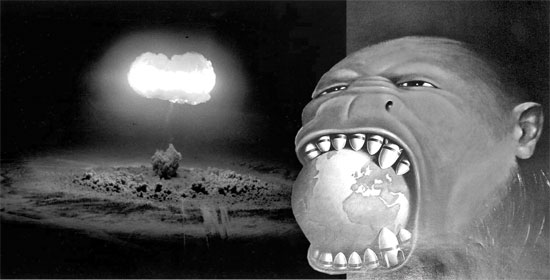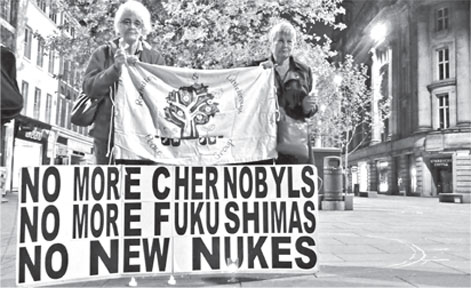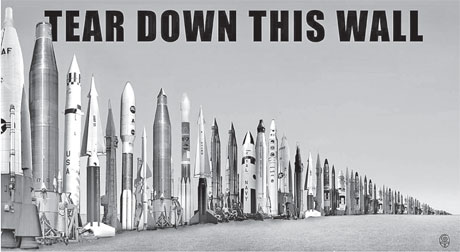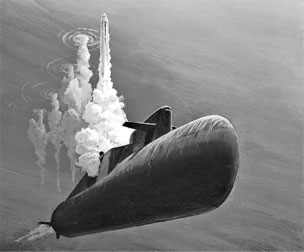|
World Disarmament Week begins tomorrow:
Towards a nuclear weapon-free world
By Pramod DE SILVA
The world has around 50,000 nuclear weapons, enough to blow it to
smithereens many times over. Having lived under a nuclear shadow for
nearly 60 years, this is indeed a worrying factor in a highly volatile
world with a myriad of conflicts. John F. Kennedy once warned that
“every man, woman, and child lives under a nuclear sword of Damocles,
hanging by the slenderest of threads, capable of being cut at any
moment.”
 And
it is not only nations who could have access to weapons – terrorist
groups may get hold of and try to use chemical, biological and worse,
nuclear weapons. That would be an unimaginable nightmare. And
it is not only nations who could have access to weapons – terrorist
groups may get hold of and try to use chemical, biological and worse,
nuclear weapons. That would be an unimaginable nightmare.
Another perspective on the weapons race is that if the superpowers
and other powerful nations cut their defence spending even by a
fraction, there will be enough funds to address most of the problems
faced by developing nations. A weapon-free world, especially a nuclear
weapon-free world, is thus an ideal ingredient for world peace and
harmony. This, however, is more complex than it sounds, because apart
from the five established (or declared) nuclear powers (US, Russia,
France, China and UK), several other states are believed to be having or
developing nuclear weapons. It is difficult to restrain nuclear
proliferation in a world where more countries have the capability to
build a nuclear bomb.
Many nations plan to push the United States and other powers to
honour their commitments to move towards eliminating their nuclear
arsenals when the First Committee of the UN General Assembly, the arm of
the world body devoted to disarmament and international security, begins
its 2011 sessions this week. It is an appropriate period too – it
coincides with the International Disarmament Week, from October 24-30
and the UN Day itself (October 24).
The nuclear powers have taken "important steps such as New START,
reductions by France and the UK." United Nations disarmament chief
Sergio Duarte declared in an interview, "but this is understood by other
members, particularly the Non-aligned Movement, as being too slow. This
is a perception of the UN".
After all, the majority of UN members had been in the vanguard of the
movement against weapons of mass destruction, be they nuclear, chemical
or biological.
Arms race
 The
annual observance of Disarmament Week, which begins on the anniversary
of the founding of the United Nations, was called for in the Final
Document of the General Assembly 1978 special session on disarmament.
States were invited to highlight the danger of the arms race, propagate
the need for its cessation and increase public understanding of the
urgent tasks of disarmament. The
annual observance of Disarmament Week, which begins on the anniversary
of the founding of the United Nations, was called for in the Final
Document of the General Assembly 1978 special session on disarmament.
States were invited to highlight the danger of the arms race, propagate
the need for its cessation and increase public understanding of the
urgent tasks of disarmament.
As the UN notes, the world would be a more peaceful place if there
were fewer weapons. An important component of even the earliest peace
movements was to advocate for disarmament.
Thus "Peace through Disarmament" is a major focus for the United
Nations. This excerpt from the Department for Disarmament Affairs'
vision statement sums up this avenue of the UN's work:"We acknowledge
that disarmament alone will not produce world peace. Yet we also
maintain that the elimination of weapons of mass destruction (WMD),
illicit arms trafficking, and burgeoning weapons stockpiles would
advance peace and development goals. It would accomplish this by
reducing the effects of wars, eliminating some key incentives to new
conflicts, and liberating resources to improve the lives of all people
of the United Nations and the natural environment in which they live."
Disarmament efforts focus on two basic types of weapons - weapons of
mass destruction, including nuclear, biological and chemical weapons,
and small arms. The latter is very important - do you know that there
are more than 600 million guns in the world? One million people are
injured by guns each year and 300,000 people are killed.
But the main focus shall remain on the nuclear weapons, for they have
enormous destructive power, as seen in Nagasaki and Hiroshima.
The last President of the USSR Mikhail Gorbachev, in a recent opinion
piece wrote: “Critics present nuclear disarmament as unrealistic at
best, a risky utopian dream at worst. They point to the Cold War’s “long
peace” as proof that nuclear deterrence is the only means of staving off
a major war.
"As someone who has commanded these weapons, I strongly disagree.
Nuclear deterrence has always been a hard and brittle guarantor of
peace. By failing to propose a compelling plan for nuclear disarmament,
the US, Russia and the other nuclear powers are promoting a future in
which nuclear weapons will inevitably be used. That catastrophe must be
forestalled.”
Collective responsibility
Forestalling that catastrophe is the collective responsibility of all
Member States of the UN. The five nuclear powers - China, France,
Russia, the United Kingdom and the United States - agreed to work on
disarmament steps as part of a 2010 review conference. That meeting's
final document contained strong language affirming "the need for the
nuclear-weapon states to reduce and eliminate all types of their nuclear
weapons." Toward that goal, it noted "the urgent need for the
nuclear-weapon states to implement the steps leading to nuclear
disarmament."
 There
has been some progress. The 1987 Intermediate-Range Nuclear Forces
Treaty destroyed the feared quick-strike missiles threatening Europe’s
peace. The first Strategic Arms Reduction Treaty (1991) cut the bloated
US and Soviet nuclear arsenals by 80 percent over a decade. There
has been some progress. The 1987 Intermediate-Range Nuclear Forces
Treaty destroyed the feared quick-strike missiles threatening Europe’s
peace. The first Strategic Arms Reduction Treaty (1991) cut the bloated
US and Soviet nuclear arsenals by 80 percent over a decade.
The US-Russian New START agreement that entered into force earlier
this year is another such step. The accord requires both governments to
reduce their arsenal of deployed strategic systems to no more than 1,550
warheads and 700 delivery devices. But many neutral countries have
called for a Comprehensive Test Ban Treaty, a Nuclear Weapons Convention
and a total ban on space weapons.
The Non-aligned Movement (NAM), of which Sri Lanka is a pivotal
member, has emerged as a strong voice against nuclear weapons. "The main
objective is the total elimination of nuclear weapons," said Fikry
Cassidy, minister-counsellor for Indonesia. "We don't see anything yet,
at the moment, going to that objective." His comments have been endorsed
by many other NAM nations.
Another frustrating point is that the nuclear states are not very
transparent about the size of their arsenal. Only the United States has
released the exact number of deployed and reserve weapons in its
commissioned nuclear arsenal - 5,113. France has also said it has
brought down its nuclear weapons stockpile to around 300.
However, this is still too much because Article 6 of the Nuclear
Non-proliferation Treaty (NPT) requires nuclear powers to pursue
complete disarmament. In view of this, the United States plans to
co-sponsor a resolution submitted by Japan promoting the goal of
complete disarmament.
Special session
Several nations have also called for a Special Session on Disarmament
in the UN General Assembly. The last such meeting took place in 1998. A
Comprehensive Test Ban Treaty has also gained traction at the UN, though
several nuclear powers have still not warmed up to the idea.
The other major factor is WMD terrorism including nuclear terrorism.
"That's a constant concern and probably one of the biggest threats
seen by delegations that nuclear weapons would be in the hands of
non-state actors," a UN delegate told the media.
 But
the biggest item on the agenda seems to be revitalising the disarmament
debate and machinery, particularly the Conference on Disarmament, the
main international forum for negotiating arms control accords. But
the biggest item on the agenda seems to be revitalising the disarmament
debate and machinery, particularly the Conference on Disarmament, the
main international forum for negotiating arms control accords.
Then come biological weapons and normal chemical weapons. The First
Committee meeting comes shortly before the Biological Weapons
Convention's review conference in December. Several countries will not
be able to meet a 2012 deadline for destruction of their chemical
weapons stocks. However, the Chemical Weapons Convention has been hailed
as a success story overall.
But the biggest reason for cutting down on the nuclear and other
weapons is the sheer expenditure on arms. The total world expenditure on
armament in 2008 was estimated at US$ 1,226 billion. From 1999 to 2008
this expenditure increased by 45 percent. Just imagine what could be
done to build a better world with these enormous resources. From
schooling for all the world’s children to better drinking water for
one-third of the world’s population, nothing will be out of reach. That
is the kind of race we can be proud of, not a race where everyone dies
in the end. |

